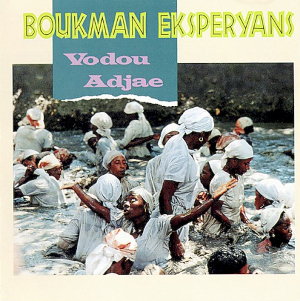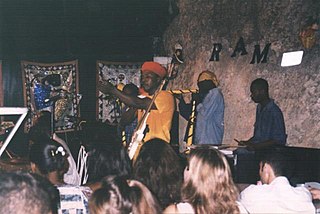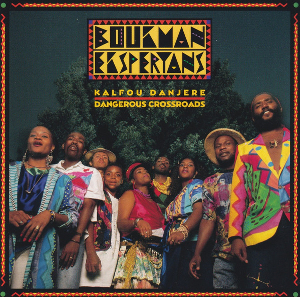The music of Haiti combines a wide range of influences drawn from the diverse population that has settled on this Caribbean island. It often has hints of French, African rhythms, Spanish elements and others who have inhabited the island of Hispaniola and minor native Taino influences. Styles of music unique to the nation of Haiti include music derived from rara parading music, twoubadou ballads, mini-jazz rock bands, rasin movement, hip hop Creòle, the wildly popular compas, and méringue as its basic rhythm. Haitian music is influenced mostly by European colonial ties and African migration. In the case of European colonization, musical influence has derived primarily from the French.

Boukman Eksperyans is a mizik rasin band from the city of Port-au-Prince, Haiti, Grammy nominated for their debut album Vodou Adjae. The band derives its name from Dutty Boukman, a vodou priest who led a religious ceremony in 1791 that is widely considered the start of the Haitian Revolution. The other half of the band's name, "Eksperyans", is the Haitian Creole word for "experience", and was inspired by the band's appreciation of the music of Jimi Hendrix. The band was at the height of its popularity in 1991 when the presidency of Jean Bertrand Aristide was overthrown in a military coup d'etat. Like many other artists and performers, Boukman Eksperyans fled the country to live in exile. During their time abroad, the band performed and spoke out against the military dictatorship of Raoul Cédras. In 1994, after Aristide was restored to power, the band returned to Haiti, where they continued to play concerts, record albums, and perform at the Carnival celebrations.
Dutty Boukman was an early leader of the Haitian Revolution. Born in Senegambia, he was enslaved to Jamaica. He eventually ended up in Haiti, where he became a leader of the Maroons and a vodou houngan (priest).

Vodou Adjae is the first album of the Haitian music group Boukman Eksperyans. It is distributed in the United States and Canada by Mango, a division of Island Records. All of the songs are in Haitian Creole.

Darryl Jones is an American bassist. He has been recording and touring with the Rolling Stones since 1993. He has also played in bands with Miles Davis and Sting, among others.

RAM is a mizik rasin band based in the city of Port-au-Prince, Haiti. The band derives its name from the initials of its founder, songwriter, and lead male vocalist, Richard A. Morse. The band's music has been described by Morse as "Vodou rock 'n' roots", and has been one of the prominent bands in the mizik rasin musical movement in Haiti. RAM began performing together in 1990, and recorded their first album in 1996. The band's music incorporates traditional Vodou lyrics and instruments, such as rara horns and petro drums, into modern rock and roll. The band's songs include lyrics in Haitian Creole, French, and English.
Rasin, also known as Haitian roots music, is a musical style that began in Haiti in the 1970s when musicians began combining elements of traditional Haitian Vodou ceremonial and folkloric music with various musical styles. The late 20th century style of this music links to the roots of Vodou tradition, where it came to be known as mizik rasin later in Haitian Creole. Modern-day, the movement is often referred to simply as "rasin" or "racine".
Boukan Ginen is a mizik rasin band from the city of Port-au-Prince, Haiti. Boukan is the Haitian Creole word for "bonfire" or "fire pit". Ginen is a specific Haitian name for the ancestral home of enslaved Africans.
Ayibobo is a band from New York City, United States that is Jean-Paul Bourelly's side project. Ayibobo is one spelling of a Haitian Creole word that means "amen". MusicHound described the band as combining "Haitian singers and drummers with jazz horns, Bourelly's style, and EU drummer Ju Ju House."

Haitian Vodou is an African diasporic religion that developed in Haiti between the 16th and 19th centuries. It arose through a process of syncretism between several traditional religions of West and Central Africa and Roman Catholicism. There is no central authority in control of the religion and much diversity exists among practitioners, who are known as Vodouists, Vodouisants, or Serviteurs.

"Train Kept A-Rollin'" is a song first recorded by American jazz and rhythm and blues musician Tiny Bradshaw in 1951. Originally performed in the style of a jump blues, Bradshaw borrowed lyrics from an earlier song and set them to an upbeat shuffle arrangement that inspired other musicians to perform and record it. Johnny Burnette and the Rock and Roll Trio made an important contribution in 1956 – they reworked it as a guitar riff-driven song, which features an early use of intentionally distorted guitar in rock music.

Ton-Ton Macoute! is the 1970 debut solo album of American blues musician Johnny Jenkins. Jenkins had previously led The Pinetoppers, a band which at one time featured Otis Redding. Jenkins then appeared on two Redding albums, playing guitar, before releasing his solo debut.

"The Spider and the Fly" is a song by English rock band the Rolling Stones, recorded in May 1965 and first released on the US version of their 1965 album Out of Our Heads. In the UK, it was released as the B-side to "(I Can't Get No) Satisfaction". In 1971, the song was released on an album for the first time in the UK on the Decca Records compilation Stone Age.
Richard Auguste Morse is a Puerto-Rican-born Haitian-American musician and hotel manager currently residing in Port-au-Prince, Haiti. Morse manages the Hotel Oloffson, and is the founder of a mizik rasin band, RAM, named after his initials. Morse is married to the band's lead female vocalist, Lunise Morse, and has two children. Morse and his band are famous in Haiti for their political songs and performances critical of the Raoul Cédras military junta from 1991 to 1994. In the early 2000s, Morse has also criticized Jean-Bertrand Aristide and Fanmi Lavalas through his music. Morse is a United States citizen. His cousin Michel Martelly is a musician, right-wing Haitian politician and former President of Haiti. Richard Morse repeatedly expressed support for Martelly in the 2010 presidential elections in Haiti. By the end of 2012, he had distanced himself from the Martelly government.
John Steve Brunache is a famous Haitian musician who came to prominence during the 80's and 90's. He is an influential figure who spoke on the issues of the times with such songs as "La Relev", "Chimen Limye", and "timoun yo".
Twoubadou music is a popular genre of guitar-based music from Haiti that has a long and important place in Haitian culture. The word comes from troubadour, a medieval poet-musician who wrote and sang songs about courtly love. Like the troubadours of old, the Haitian twoubadou is a singer-composer who accompanies himself on songs that tell about the bitterness and humor of love, often using risqué or suggestive lyrics.
Eddy François is a Haitian musician,

Kalfou Danjere is an album by the Haitian band Boukman Eksperyans, released in 1992. The title track, which translates to "Dangerous Crossroads", was banned in Haiti for its alleged subversive qualities. "Nwel Inosan" was also banned.









